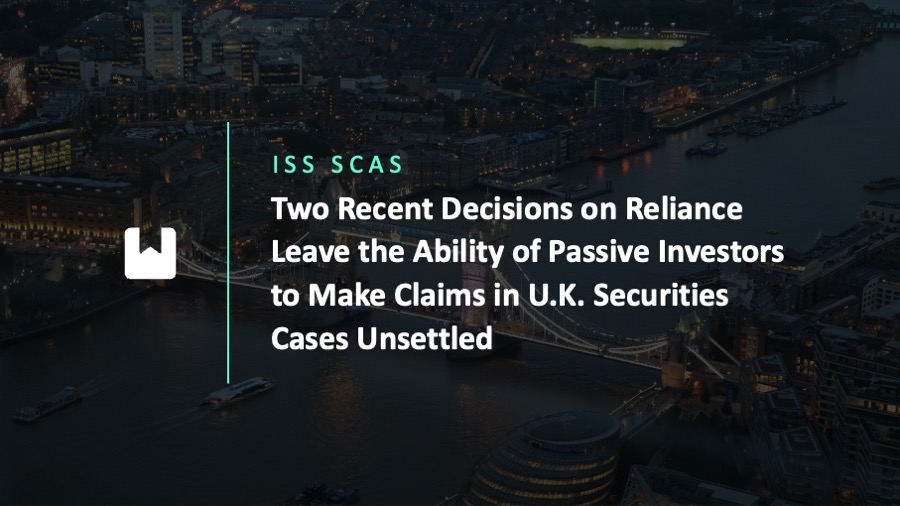There have been two recent decisions in the High Court of Justice in the United Kingdom that could have wide potential implications for passive investors pursuing securities claims in that jurisdiction. In an October 25, 2024, judgment in Allianz Funds Multi-Strategy Trust & Ors v. Barclays plc [2024] EWHC 2710 (Ch) (“Barclays”), Mr. Justice Thomas Leech decided that passive investors were unable to prove reliance as a matter of law and therefore could no longer continue their securities claims. However, Mr. Justice Michael Green in a March 25, 2025, judgment in Persons Identified in Schedule 1 v. Standard Chartered plc [2025] EWHC 698 (Ch) (“Standard Chartered”), took a wholly different track and allowed the claims of passive investors to proceed to trial. These two opposing decisions so close in time together show that the law on whether passive investors may pursue securities claims in the U.K. is unsettled and ripe for a clarifying decision from an appellate court.
Some investors are active in that they review company filings, earnings calls, and market data in order to make trading decisions. Other investors are passive, purchasing shares to track indices or meet some sort of benchmark. A common and important element in securities litigation in many jurisdictions is reliance. In other words, if a company were alleged to have made a false statement that artificially inflated the price of its security, the claimant investor must have relied on that statement deciding to purchase that security.
In the United States, there is a presumption of reliance in securities class actions, such that if plaintiffs can show that a security traded in an efficient market, then it is presumed that the price of the security incorporated all public information, which would therefore also include any alleged false statements. Thus, the key in the U.S. is establishing market efficiency for a security and defeating any attempts by defendants to rebut the presumption of reliance (usually arguments that the alleged false statements did not impact the price of the security). But in other jurisdictions, claimants may need to show evidence of actual reliance, such as an internal memo by a portfolio manager listing the alleged false statement as a reason to buy, hold, or sell. In such jurisdictions, passive investors are therefore unable to show such specific evidence. A middle ground would be an investor who did not review an alleged misrepresentation but relied upon independent sell-side research reports to inform its investment decision, where such reports in turn considered the alleged false statements.
Claims in securities suits in the U.K. are typically made under the Financial Services and Markets Act of 2000 (“FSMA”). A key provision of the FSMA states, among other things, “[a]n issuer of securities [] is liable to pay compensation to a person who — (a) acquires, continues to hold or disposes of the securities in reliance on published information” (emphasis added).1 In Barclays, investors alleged that Barclays made false statements related to its ‘dark pool’ trading system. Barclays moved for summary judgment for, among other things, claims made by passive investors because they were unable to claim reliance. Leech J agreed with defendants, finding the use of the term reliance in the FSMA meant that “Parliament did not intend to ‘start afresh’ but recognised that the Courts have developed a separate test of reliance in the tort of deceit[.]”2 He elaborated that investors cannot “satisfy this test unless their representatives read and considered that public information or third parties who directed or influenced their investment decisions read and considered the published information.”3 Thus, Leech J declined to find that the U.K. recognized a presumption of reliance as in the U.S. As a result, ₤332 worth of claims for 241 claimants (about 60% of the total value of all claims) were struck out of the case, which settled before appeal to a higher court.4
As a wider consequence, Barclays cast into doubt whether passive investors would ever be able to successfully make securities claims. Indeed, now some litigation funders and law firms have been looking at damages in aggregate both among all claimants and just among active investors, because the valuation and viability of cases could potentially change dramatically if passive investors were excluded. Furthermore, if the Barclays holding were ultimately to prevail, it would likely substantially reduce the size of settlements and number of cases in the U.K. However, Leech J is simply a judge of court of first instance, not an appellate judge, so arguably his judgment does not have precedential effect.
Meanwhile, Standard Chartered was also pending. That case involves securities allegations related to alleged non-compliance with international sanctions requirements. Standard Chartered moved for summary judgement on, among other things, claims of passive investors due to the ruling in Barclays, arguing that as a matter of judicial comity to avoid duplication of judicial resources and to achieve consistency in the law, Green J should follow this ruling.5 It was contended that if he were to do so, ₤762 million worth of claims for 949 funds (about 49% of the total value) would be eliminated.6
However, Green J declined to strike out the claims of passive investors, allowing for this issue to be determined based on the factual record at trial. He stated, “I think it would be to ignore reality to suggest that this is not a live and possibly developing area of the law. [] It was probably anticipated that [Barclays] would be appealed but as it turned out the case settled” beforehand.7 He decided to not apply Barclays, as he doubted whether, “the common law test for reliance was intended by Parliament to be adopted for the requirement to prove ‘reliance’” because it did not make sense in relation to omissions and did not seem to work consistently with applications to misstatements.8
SCAS reached out to John Evans, Head of Dispute Resolution at Fladgate LLP (a London based law firm with a track record of acting in substantial class actions) for his perspective on the rulings. “The recent judgment of Green J in Standard Chartered should be greeted positively by all investors who potentially have securities claims in the United Kingdom” said Evans. “It seems only equitable that the question of whether or not a class of investors have a sustainable right to participate in a securities claim should be decided at a full trial of the action, when all of the relevant facts are put before the Court, rather than at an early stage when, as a matter of necessity, only limited evidence can be adduced before the judge. It remains important to assess whether investors are active or passive investors in the relevant security, to ensure that the prospective claim can weather further developments and remain financially viable. Green J’s judgment is a welcome demonstration that just because an investor is passive, does not prevent that investor from joining collective redress actions in England to seek compensation for its losses.”
In sum, the practical effect of Standard Chartered is that these claims live on in that case but could still be eliminated at trial. The wider implication of the decision is that the law is truly unsettled on reliance. It is not clear what might happen if there is a trial in Standard Chartered, and it is possible that another court, quite possibly (if not likely at some point) the Court of Appeals, would render a decision on this precise issue. The U.K. Parliament could even pass legislation clarifying the law. As such passive investors in the U.K. are stuck in something of a lurch, as the law could evolve in either direction. Regardless, this is an important topic and another question investors will have to weigh in evaluating actions in the U.K. as the value of claims could vary dramatically depending on which way the law develops.
1 Standard Chartered at ¶23.
2 Barclays at ¶107.
3 Barclays at ¶129.
4 Standard Chartered at ¶4.
5 Standard Chartered at ¶5.
6 Standard Chartered at ¶4. Notably, the California State Teachers’ Retirement System (“CalSTRS”) provided a witness statement in the action, underscoring the importance of global actions to U.S. based investors. Standard Chartered at ¶28.
7 Standard Chartered at ¶16.
8 Standard Chartered at ¶85.
“No portion of this insight constitutes legal or financial advice, and no attorney-client relationship is intended or is established.”
By:
Donald F. Grunewald, Director of Litigation Analysis, ISS SCAS




